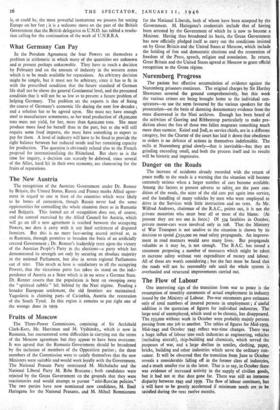What Germany Can Pay
In the Potsdam Agreement the four Powers set themselves a problem in arithmetic in which many of the quantities are unknown and at present perhaps unknowable. They have to reach a decision by February 2nd on the amount of industry in the western zones which is to be made available for reparations. An arbitrary decision might be simple, but it must not be arbitrary, since it has to fit in with the prescribed condition that the future standard of German life shall not be above the general Continental level, and the presumed conditidn that it will not be so low as to present a future problem of helping Germany. The problem set the experts is that of fixing the course of Germany's economic life during the next few decades ; and a solution has to be agreed upon. She must not have enough steel to manufacture armaments, so her total production'of 18,500,000 tons must not yield, for her, more than 6,000,000 tons. She must produce more food for herself than in the past, but as she will still require some food imports, she must have something to export to pay for them. A level of industry will have to be fixed to provide the right balance between her reduced needs and her remaining capacity for production. The question is obviously related also to the French proposal for internationalising the Rhineland. But short as is the time for inquiry, a decision can scarcely be deferred, since several of the Allies, hard hit in their own economy, are clamouring for the fruits of reparations.






























 Previous page
Previous page